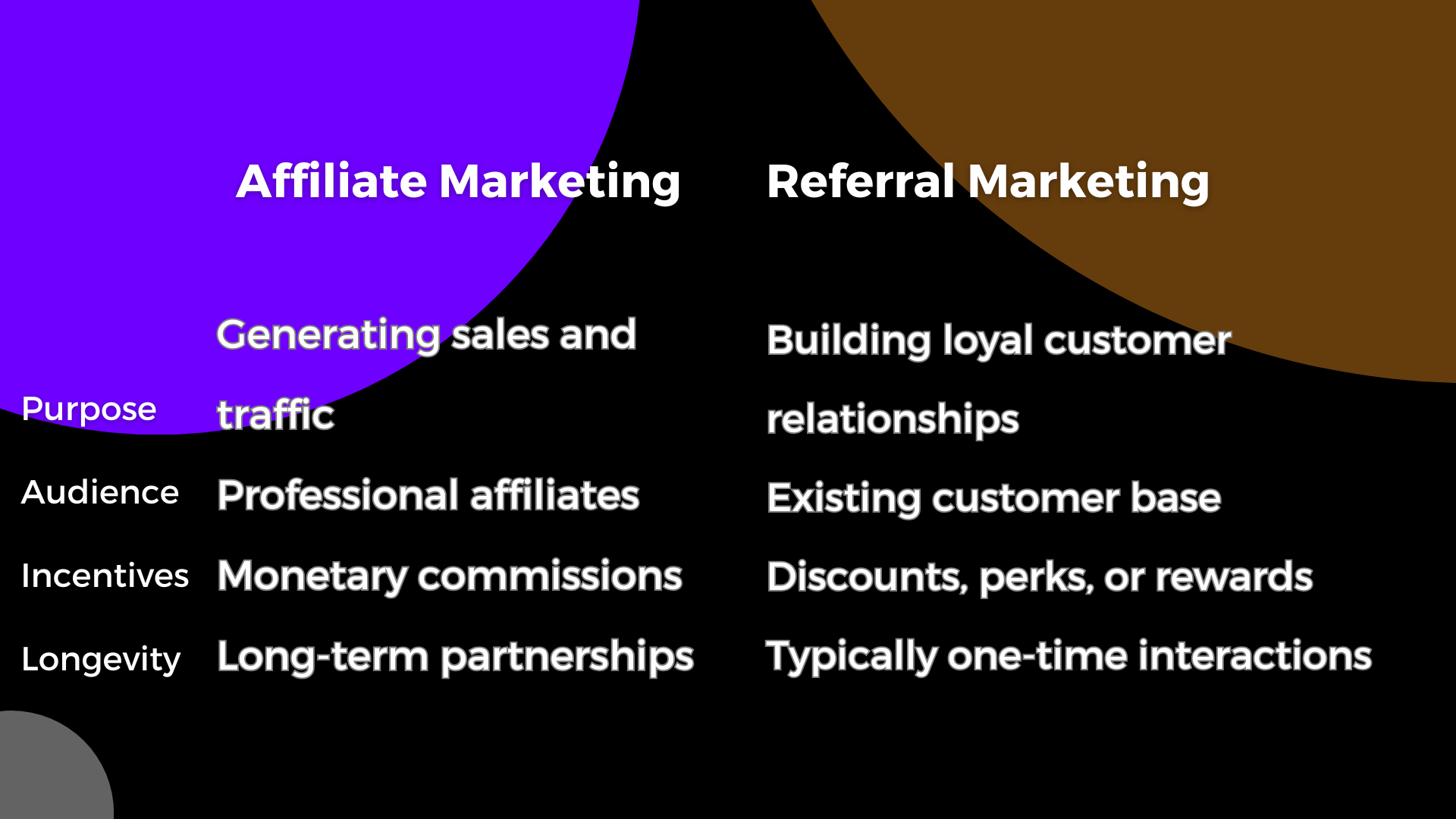Affiliate Marketing vs Referral Marketing: What Sets These Strategies Apart?
With many ways to draw in, convert, and keep consumers, digital marketing has evolved into a major force behind corporate expansion. Affiliate marketing vs referral marketing are popular but often confused. Although their goals are to raise income and reach, they take fundamentally different routes.
Businesses need to understand these differences to use the correct strategy.
What Is Affiliate Marketing?
Under a performance-based marketing approach known as affiliate marketing, companies work with partners — affiliates — to highlight their products or services. Affiliates get paid for sharing links, creating content, and running advertising to generate traffic, leads, and purchases. This approach helps affiliates who can make money by using their platforms and audiences as well as companies who get more visibility and sales. This win-win strategy is growing popular across industries.
How do affiliate programs work?
-
A merchant invites users of a created linked program.
- Affiliates promote the merchant’s product via tracking links.
- Customers purchase through these links; affiliates are paid a share.
-
The merchant tracks and evaluates affiliate performance via a platform or technology.
What Is Referral Marketing?
Referral marketing is centered on motivating current consumers to suggest the products or services of a company to friends, relatives, or social media networks. Businesses encourage loyal consumers to report pleasant experiences by offering discounts, free items, or other benefits. This method makes use of word-of-mouth, sometimes regarded as one of the most reliable and efficient kinds of marketing. The customer referral program is more trusted, making referral marketing a powerful tool for brand exposure and customer acquisition.
How it works?
-
Companies set up a referral system with attractive benefits.
- New customers receive a unique referral link or code from existing customers (referrers).
- The referrer gains something when the referee purchases.
-
The company tracks referral success via a platform or software.
Key Differences Explained: Deep Dive into the Referral Marketing vs Affiliate Marketing Strategies
 Objective and Focus
Objective and Focus
Generally, affiliate marketing programs aim to increase revenue, improve website traffic, and extend brand exposure. It uses professional affiliates, bloggers, and influencers who promote products and services for commissions. Expanding the market to fresh, unexplored audiences comes first most of the time.
Referral marketing, on the other hand, focuses on strengthening customer relationships. Based on trust and word-of-mouth marketing, it aims to convert satisfied customers into devoted brand champions who suggest the product to their networks.
Referral vs Affiliate Marketing: Audience and Participants
Professional partners who have created online platforms, blogs, or social media followings enable affiliate marketing. Many affiliates are independent marketers who offer products to a wide audience. Based on agreed commissions, the interaction between the company and the affiliate is transactional.
A brand’s referred customers promote items or services to friends, family, or peers via referral marketing. Referral marketing involves real users sharing their honest experiences with others, not professionals, which gives the strategy more authenticity and a personal feel.
Rewards Structure
The affiliate marketing reward structure is usually monetary. Through an affiliate link or promotion, partners earn a set commission for each sale, lead, or action they create. Financial motivation guarantees long-term partnerships but may lead to less personal promotion.
By contrast, referral marketing program emphasizes providing non-financial incentives including discounts, gift cards, free items, or special benefits. These awards promote client loyalty, repeat business, and experience sharing.
Nature of Engagement: Affiliate vs Referral Marketing
Affiliate marketing efforts typically involve long-term engagements with affiliates who repeatedly promote a company’s products or services over time. Affiliates could highlight what fits their platform’s niche and promote several products. Professional affiliates make this strategy scalable.
On the other hand, referral marketing is sometimes a one-time or temporary engagement when consumers suggest a good or service after having very positive experiences. Some referral schemes include tiered prizes or incentives to keep people engaged, but the main purpose is to capitalize on organic recommendations at a certain time.
 Scalability and Reach
Scalability and Reach
Since affiliate marketing allows companies to leverage different demographics across several platforms by including partners with known audiences, it presents notable scalability. Affiliate partners often improve a brand’s reach beyond its customers.
While powerful, referral marketing is less scalable since it depends on the direct social networks of current consumers. Since these suggestions come from credible sources, their personal touch generally increases conversion rates.
Knowing these variations helps companies to choose which strategy best fits their objectives. Affiliate marketing expands market reach, while successful referral marketing strengthens client relationships, making both – affiliate marketing vs referral marketing – useful for different marketing goals.
Blurring Lines: Can Affiliate and Referral Marketing Work Together?
Affiliate and referral marketing can operate together under certain conditions. Key ideas on integrating these two approaches and their possible benefits are below.
Targeting Different Audiences
Affiliate marketing leverages influencers, blogs, and third-party websites to attract a wider audience, whereas referral marketing uses personal networks to target existing clients. Combining both referral and affiliate programs allows businesses to target multiple audience segments using affiliates’ extensive reach and referrals’ personal recommendations.
Building Trust and Credibility
Affiliate programs often act as a bridge to introduce brands to an audience unfamiliar with them. Referral marketing, on the other hand, carries a higher level of credibility due to the personal connection. Integrating the two can create a layered approach where affiliate campaigns bring awareness, and referral programs deepen trust to drive conversions
Shared Incentives for Referral Marketing vs Affiliate Marketing Channels
Businesses can reward affiliates and referred clients via cooperative initiatives. An affiliate can be compensated for both traffic and high-quality referrals that result in sales. Exclusive deals for referred clients create a win-win situation that encourages both players to take part.
Data-Driven Insights
Merging affiliate and referral campaigns allows companies multiple data sets to understand performance patterns. Monitoring how both channels interact helps improve plans, tactics, and results.
Unified Technology Platforms
Technology solutions that support affiliate and referral networks ensure smooth integration. Such solutions can track multi-channel effectiveness, manage affiliate and referral earnings, and ease management for organizations using affiliate and referral programs simultaneously.
Businesses may increase reach, trust, and conversions by combining affiliate marketing vs referral marketing strengths. To ensure both channels work together to achieve goals, careful planning, clear targets, and efficient tracking are needed.
Challenges and Pitfalls to Avoid in Both Strategies
 Lack of Clear Communication with Partners
Lack of Clear Communication with Partners
Not communicating affiliate and referrer expectations, goals, and rules can lead to misunderstandings and unproductive campaigns. To ensure partner alignment with brand goals and standards, businesses must communicate openly.
Overlapping or Conflicting Incentives
Mismanaging incentive schemes can cause affiliate and referral partner conflicts, uncertainty, and competition that hurts performance. Businesses should create complementary incentive programs to prevent affecting either group.
Insufficient Support or Resources Provided to Partners
Affiliates and referral partners help businesses grow, but they need support. Assistance can include banners, email templates, and social media content to promote effectively, training sessions or guides to help them understand the product or service they’re supporting, and reporting tools to track performance and optimize referral marketing vs affiliate marketing efforts.
Inefficient Tracking and Attribution
Without effective monitoring tools, affiliate and referral results can be hard to identify. This makes success measurement and resource allocation difficult. Strong analytics and tracking technologies are important.
Partner Quality Control Issues
Unvetted affiliates or referrers can damage a brand’s reputation, especially if they misrepresent the company, act unethically, or miscommunicate crucial information. These mistakes can cause client distrust, unfavorable reviews, and long-term brand damage. Businesses must carefully identify partners who share their beliefs and standards to prevent such hazards.
Conclusion: Choosing the Right Strategy for Your Business
Affiliate marketing vs referral marketing are both strong in their own way; the decision between them will rely on your particular objectives and requirements. If you want to reach more people, affiliate marketing is perfect. Businesses can enter new markets and raise brand awareness by working with associates who advertise their products or services to potential customers. However, referral marketing is more personal and effective for building trust and long-term client relationships. Encouragement of satisfied clients to suggest your company to friends and relatives not only results in new customers but also enhances loyalty among your current base. With the correct goals, both tactics work well.
Struggling to decide or implement your strategy? Partner with Webugol Agency for a free digital marketing analysis tailored to uncover market insights, and experience powerful advertising across all platforms with daily optimizations. Let’s achieve your goals together!


